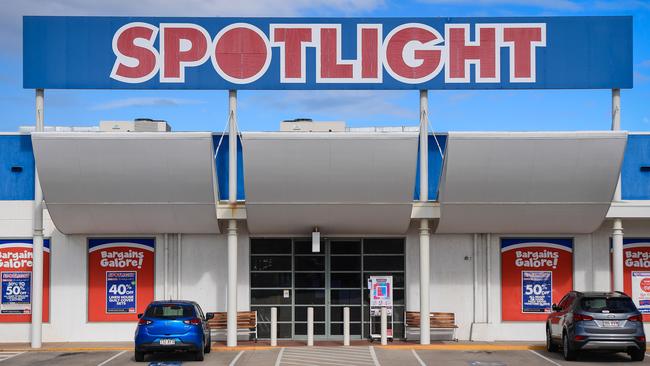Spotlight uses virus to squeeze suppliers
The billionaire-backed retailer has pushed out its payment terms to suppliers by a month and forced them to take a discount.

Spotlight Group was hailed a hero, rescuing collapsed retailer Harris Scarfe from administration, but the home improvement group is now using the coronavirus to delay payment terms to suppliers by a month and charge a fee for doing so.
Spotlight, owned by rich listers the Melbourne-based Fried and Fraid families and estimated to be worth more that $1.65bn, has pushed out its payment terms by a month and hit suppliers with an extra 5 per cent settlement discount.
This means suppliers, who are facing an unprecedented cash flow crunch from COVID-19 are not only waiting longer to be paid they are also being paid less at a time when many have been forced to close or are struggling to survive.
While the company, which also owns Anaconda, Mountain Designs and Harris Scarfe as well as its flagship Spotlight chain, has closed stores in Tasmania, New Zealand, Singapore and Malaysia, its mainland Australian stores have remained open and, like supermarkets, have been the beneficiaries of a remote, self-isolating workforce during the pandemic.
AlphaBeta and Illion data shows the home improvement sector has experienced a 14 per cent lift in sales in the week from April 6 to 13. Indeed, in a letter to suppliers, Spotlight managing director Avi Gilboa said the company would not qualify for the federal government’s $130bn JobKeeper wage subsidy.
“Spotlight requires a minimum 50 per cent fall in sales to qualify for any JobKeeper government support. Consequently, in the absence of more enforced store closures, government assistance is therefore highly unlikely,” Mr Gilboa.
“Other large retailers in a similar position to us have made the decision to close store networks, stand down thousands of employees and mitigate the financial impact to them by utilizing the JobKeeper program”.
“Our contrarian approach remains focused on doing everything possible to maintain our store networks open and thus support our 8000 plus employees, customers, suppliers and landlords.”
Mr Gilboa then writes, as part of doing everything possible, that will require suppliers waiting longer to be paid and taking a haircut on their invoices.
“COVID-19 is neither caused by or within the control of either our group or of our suppliers, however it is both equitable and in our respective short and long-term interests to continue to support each other.
“In light of the above burden-sharing principle, effective immediately, all suppliers will therefore be paid on settlement terms of an additional 30 days, and an additional 5 per cent settlement discount over and above current terms.
“Suppliers will thus be required to sacrifice margin and trading terms headroom and Spotlight will reciprocate by continuing to invest in our marketing, team members and stores to unlock maximum demand for your products.”
Small Business Ombudsman Kate Carnell criticised Spotlight, saying pushing on any cashflow difficulty to smaller suppliers was not acceptable.
“And you can’t have settlement discounts if you are not paying your bills on time. However, Spotlight is not Robinson Crusoe in this regard,” Ms Carnell said.
A spokesman for the company declined to comment.
Myer, which was highlighted in Ms Carnell’s review into supply chain finance arrangements, also uses settlement discounts, while Sussan Group, Solomon Lew’s Just Group and Flight Centre have all used the COVID-19 pandemic to push out payment times.
Meanwhile US oil major Chevron – which has paid zero income tax in Australia in the past five years, despite generating local revenue of $15.8bn in that time – unleashed a so-called “early payment scheme”, which involved charging suppliers a fee in exchange for prompt payment.
Ms Carnell has formally recommended the Morrison government legislate 30 day payment terms, saying it was the only way to ensure big businesses paid their smaller suppliers on time.
Opposition Employment and Industry spokesman Brendan O’Connor urged the government to act swiftly to stem the tide of big businesses using the coronavirus to avoid paying their smaller suppliers on time.
“Each day the government fails to act on payment times, more and more companies are emboldened to exploit small businesses,” Mr O’Connor said.
“Small businesses are particularly vulnerable due to COVID-19 and the government is not stepping up to the plate to support them. They haven’t even uttered a word in response to the Small Business Ombudsman’s payment practice report released last week. It comes down to a simple question, does the government support small business or not?”
Finance Minister Mathias Cormann confirmed last week that the government plans to implement its pre-election promise of forcing big companies who want commonwealth contracts to pay their suppliers within 20 days.
Senator Cormann said the government would also introduce its Payment Times Reporting Framework, which will require large businesses with an annual turnover over $100 million to report on their payment terms for small business suppliers, next January.
“Prior to finalising and implementing these policies, I understand that further consultation with government agencies and the private sector will take place to ensure the government strikes the right balance between policy effectiveness and regulatory burden,” he said.



To join the conversation, please log in. Don't have an account? Register
Join the conversation, you are commenting as Logout